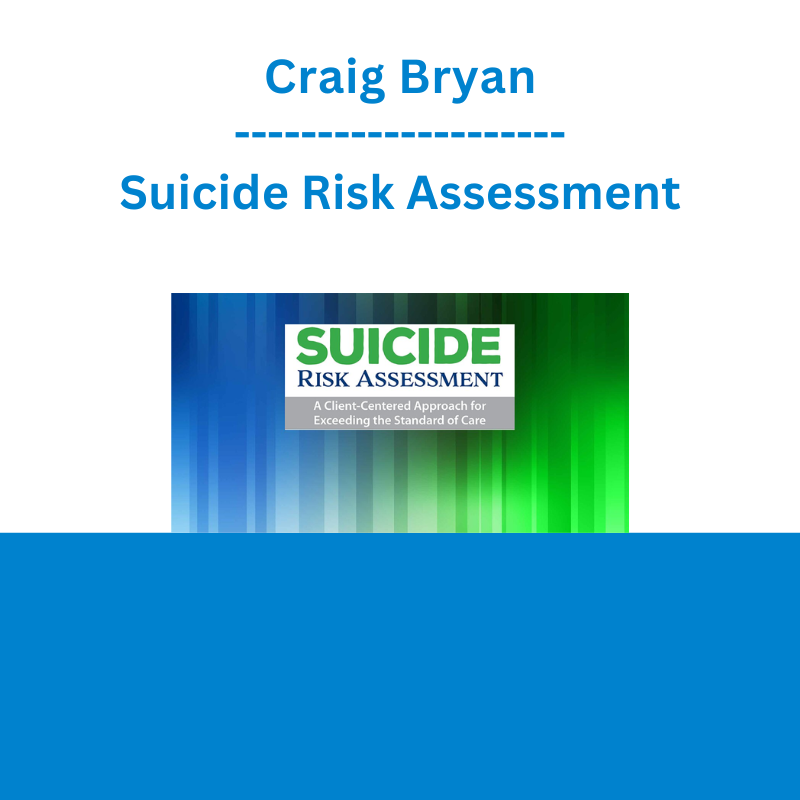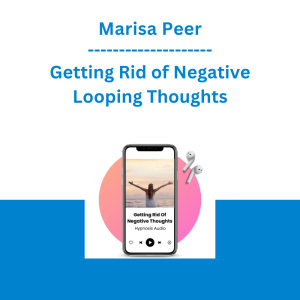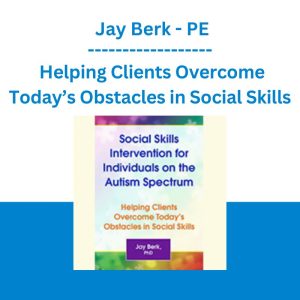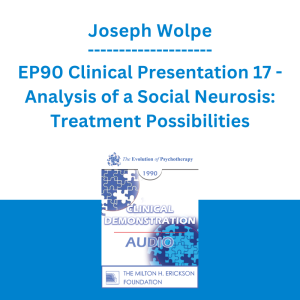*** Proof of Product ***
Exploring the Essential Features of “Craig Bryan – Suicide Risk Assessment: A Client-Centered Approach for Exceeding the Standard of Care”
Speaker: Craig J. Bryan, PsyD, ABPP | Justin Baker, PhD, ABPP
Duration: 6 Hours 10 Minutes
Format: Audio and Video
Copyright: Jul 26, 2024
Media Type: Digital Seminar
Speakers
Craig J. Bryan, PsyD, ABPP, is a board-certified clinical psychologist in cognitive behavioral psychology. He is the Stress, Trauma, and Resilience (STAR) Professor of Psychiatry and Behavioral Health at The Ohio State University Wexner Medical Center and is the division director for recovery and resilience. Dr. Bryan received his PsyD in clinical psychology in 2006 from Baylor University and completed his clinical psychology residency at the Wilford Hall Medical Center, Lackland Air Force Base, TX. Dr. Bryan deployed to Iraq in 2009, where he served as the Director of the Traumatic Brain Injury Clinic at the Air Force Theater Hospital. He separated from active-duty service shortly after his deployment, and started researching PTSD, suicidal behaviors and suicide prevention strategies, and psychological health and resiliency. He has held faculty appointments at the University of Texas Health San Antonio, the University of Utah, and The Ohio State University College of Medicine, and has managed numerous federally funded projects in excess of $30 million focused on testing treatments for reducing suicidal behaviors, developing innovative methods to identify and detect high-risk individuals, and facilitating recovery after trauma. Dr. Bryan has published hundreds of peer-reviewed scientific articles and his research has been funded by a wide range of agencies including the Department of Defense, the National Institutes of Health, the Boeing Company, the Bob Woodruff Foundation, and the Navy SEAL Foundation, and has been featured in media outlets including Scientific American, CNN, Fox News, NPR, USA Today, the LA Times, the New York Times and the Washington Post. Dr. Bryan has published over 250 scientific articles and multiple books including Brief Cognitive Behavioral Therapy for Suicide Prevention and Rethinking Suicide.
Dr. Bryan has served as the lead risk management consultant for the $25 million STRONG STAR Research Consortium and the $45 million Consortium to Alleviate PTSD, which investigates treatments for combat-related PTSD among military personnel. Dr. Bryan has served on the Board of Directors of the American Association for Suicidology, the Scientific Advisory Board for the Navy SEAL Foundation, the Educational Advisory Board of the National Center for PTSD, and as a member of the Department of Defense Suicide Prevention and Response Independent Review Committee (SPRIRC). For his contributions to mental health and suicide prevention, Dr. Bryan has received numerous awards and recognitions including the Arthur W. Melton Award for Early Career Achievement, the Peter J.N. Linnerooth National Service Award, and the Charles S. Gersoni Military Psychology Award from the American Psychological Association, and the Edwin S. Shneidman Award for outstanding contributions to research in suicide from the American Association of Suicidology. He is an internationally recognized expert on suicide prevention, trauma, and resilience.
Speaker Disclosures:
Financial: Dr. Craig Bryan has employment relationships with Canandaigua VA Medical Center, Ohio State University, and Ohio State University Wexner Medical Center. He receives royalties as a published author. Dr. Bryan is the principal investigator for the USAA Foundations, and the co-investigator for Bob Woodruff Foundation, the Department of Defense, and the National Institute of Mental Health. He is a consultant/trainer for Federal Bureau of Prisons and a consultant for Strong Star Research Consortium. Dr. Bryan is a clinical advisor with Vita Health. He receives a speaking honorarium and recording royalties from Psychotherapy Networker and PESI, Inc. He has no relevant financial relationships with ineligible organizations.
Non-financial: Dr. Craig Bryan is a member of the American Association for Suicidology, the American Psychological Association, the Association for Behavioral and Cognitive Therapies, and the International Association for Suicide Prevention. He is an ad hoc reviewer and editor for several peer review journals, for a complete list contact PESI, Inc.
Justin C. Baker, PhD, ABPP, is an assistant professor in the department of psychiatry and behavioral health at The Ohio State University and the clinical director for the Suicide and Trauma Reduction Initiative (STRIVE), a research and clinical treatment program that prioritizes evidence-based treatment for veterans, first responders, and civilians suffering from trauma and/or suicide. He is a board-certified clinical psychologist and military veteran focused on improving interventions for trauma and suicide-related disorders. His work has been funded by the Department of Defense and other private foundations. Dr. Baker is also a national consultant and sought out trainer for suicide-focused treatments. A recent recipient of the Henry A. and Amelia T. Nasrallah Award for Research Excellence in Psychiatry and Behavioral Health, his work has been featured in various media outlets to include CNN, Psychiatric Times, CBS, ABC News, CNN Health, NPR, The American Homefront Project, Yahoo, and US News & World Report.
Speaker Disclosures:
Financial: Justin Baker has employment relationships with the Ohio State Wexner Medical Center and STRIVE. He is the Principal Investigator with the Department of Defense, the co-Investigator for the Department of Defense, PRMRP, and a Psychologist for NIMH. Justin Baker receives a speaking honorarium and recording royalties from Psychotherapy Networker and PESI, Inc. He has no relevant financial relationships with ineligible organizations.
Non-financial: Justin Baker is a member of American Psychological Association. He is an ad-hoc reviewer for JAMA Network Open, the Journal of Clinical Psychology, Medical Care, and Suicide and Life-Threatening Behavior. He is an ad-hoc reviewer for several publications, for a complete list contact PESI, Inc.
Objectives
- Identify the difference between best practice and standard of care when assessing suicide risk.
- Determine the difference between chronic and acute suicide risk dimensions.
- Evaluate suicidogenic cognitions and other dimensions of suicide risk in clients.
- Utilize a narrative patient-centered approach to suicide risk assessment.
- Use appropriate clinical documentation for high-risk patients.
- Utilize a risk formulation framework of assigning suicide risk to patients.
Outline
Standard of Care Expectations
- Definition of liability
- Definition of standard of care
- Meeting the standard of care
- Foreseeability vs. reasonable care
- Documentation
- Best practices vs. standard of care
Use Suicide Risk Screening Tools Judiciously
- Purpose of screeningLimitations of suicide risk screening
- Denying suicide risk and negative suicide risk screens
- Suicide risk as a continuum
- Multiple pathways model
Distinguish Chronic vs. Acute Suicide Risk Dimensions
- Fluid vulnerability theory
- Within person variability vs. between person variability
Assess Constructs Other than Suicidal Ideation
- The suicidal mode – BCBT and CRP case conceptualization model
- Suicide risk documentation domains
- Other sample assessment tools:
- Don’t rely solely on suicidal ideation screening tools
- Suicide Cognitions Scale: a better indicator of risk
- Using the Suicide Cognitions Scale (SCS)
- SCS availability
Embrace Nuance
- Move beyond, “Client denies SI/HI.”
- Suicidal ideation is multidimensional
- Dimensions of suicidal thinking
- Suicidal planning
Adopt a Narrative Assessment Approach
- Checklist approach
- Narrative approach
- Benefits of a narrative approach
- Narrative assessment and emotion regulation
- Therapeutic alliance and suicide risk
Risk Formulation: Integrate Clinical Data
- Risk formulation framework
Clinical Demonstration and Practice
- Vignette 1
- Vignette 2
- Role play practice
Target Audience
- Psychologists
- Licensed Clinical Social Workers
- Art Therapists
- Marriage and Family Therapists
- Licensed Professional Counselors
- Psychiatric Nurse Practitioners
- Psychiatrists
- Primary Care Providers
- General Practitioners
Please see the full list of alternative group-buy courses available here: https://lunacourse.com/shop/










 Don Steele - Body Language Secrets A Guide During Courtship & Dating
Don Steele - Body Language Secrets A Guide During Courtship & Dating  Marisa Peer - Ultimate Confidence Bundle
Marisa Peer - Ultimate Confidence Bundle  Jacob Moreno - Jacob Levy Moreno: His Life and his Muses
Jacob Moreno - Jacob Levy Moreno: His Life and his Muses  The Work From Anywhere Accelerator - Christian Martin
The Work From Anywhere Accelerator - Christian Martin  Jean LaMantia - Oncology Care and Rehab: What Nutrition Can Offer
Jean LaMantia - Oncology Care and Rehab: What Nutrition Can Offer  Racing Workshop - Complete Online Package
Racing Workshop - Complete Online Package  Derek Rake - Shogun Method Black Book Volume 3
Derek Rake - Shogun Method Black Book Volume 3  Atlas API Training - API 570 Exam Prep Training Course
Atlas API Training - API 570 Exam Prep Training Course  Social Skills Intervention for Individuals on the Autism Spectrum: Helping Clients Overcome Today’s Obstacles in Social Skills - Jay Berk - PE
Social Skills Intervention for Individuals on the Autism Spectrum: Helping Clients Overcome Today’s Obstacles in Social Skills - Jay Berk - PE  Greg Loehr - Advanced Option Trading With Broken Wing Butterflies
Greg Loehr - Advanced Option Trading With Broken Wing Butterflies  Crucial Competence: Building Emotional and Social Leadership
Crucial Competence: Building Emotional and Social Leadership  The Daily Traders – Exclusive Trading Mentorship Group
The Daily Traders – Exclusive Trading Mentorship Group  Dave Landry - Stock Selection Course
Dave Landry - Stock Selection Course  What She Wants (Be A Better Man Book 3) - Aubrey Allan
What She Wants (Be A Better Man Book 3) - Aubrey Allan  Debora Chasse - 3-Day: Comprehensive Training in Women's Health: Today's Best Practices for Improving Recovery and Outcomes - PESI
Debora Chasse - 3-Day: Comprehensive Training in Women's Health: Today's Best Practices for Improving Recovery and Outcomes - PESI  Megan Yelaney - Unique Content Camp
Megan Yelaney - Unique Content Camp  Crypto Dan - The Crypto Investing Blueprint To Financial Freedom By 2025
Crypto Dan - The Crypto Investing Blueprint To Financial Freedom By 2025  Joseph Wolpe - EP90 Clinical Presentation 17 - Analysis of a Social Neurosis: Treatment Possibilities
Joseph Wolpe - EP90 Clinical Presentation 17 - Analysis of a Social Neurosis: Treatment Possibilities  Advice to Young Men - William Cobbett
Advice to Young Men - William Cobbett  Jean-Pierre Isbouts - Searching for the Historical Jesus
Jean-Pierre Isbouts - Searching for the Historical Jesus  Jared Platt - From Capture Through Edit Using Lightroom
Jared Platt - From Capture Through Edit Using Lightroom  Jared Platt - Efficient Lighting & Post-Production
Jared Platt - Efficient Lighting & Post-Production  Cedric Read, Hans-Dieter Scheuermann & The mySAP Financials Team - The CFO as Business Integrator
Cedric Read, Hans-Dieter Scheuermann & The mySAP Financials Team - The CFO as Business Integrator  John Reese - Course Label Workshop
John Reese - Course Label Workshop  Elliott Connie & Linda Metcalf - Reconnecting Couples with Solution-Focused Therapy: An intensive Online Course
Elliott Connie & Linda Metcalf - Reconnecting Couples with Solution-Focused Therapy: An intensive Online Course